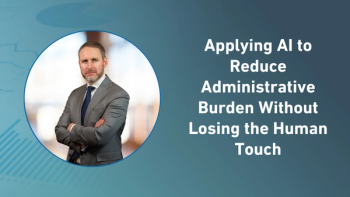
- Applied Clinical Trials-06-01-2024
- Volume 33
- Issue 6
Guiding Principles for Trial Participant Communication
Nine tips to help sites close the information and understanding gaps in their dealings with patients.
Effective communication with clinical trial participants can help to build trust, improve recruitment and retention, and reduce distress or confusion. However, there is often a disconnect between the information healthcare professionals (HCPs) and site staff believe they have communicated and a patients’ understanding.
I used to manage a large cancer and hematology clinical trials research team. I was concerned about how we were giving information to patients and whether they truly understood the implications of enrollment, the potential burden of treatment, and even their own life expectancy.
It was these concerns which led me to complete my PhD in healthcare communication. I wanted to understand in more detail the barriers to effective communication and how we could overcome them.
One participant in particular still stands out to me. She consented to participate in a Phase I trial. Her medium survival was six to 12 months. I asked a doctor to speak to her as I worried she did not have realistic expectations about her future.
When I next sat down with the patient, she was happy, calm, and said she had booked the “holiday of a lifetime” for the following year. I knew it was unlikely she would live that long. When I asked what the doctor had said, she replied they “hoped she would be well enough for her holiday.” In the moment, I had no idea how to respond. Had a conversation happened? Was the patient unable to listen to what was being said? Was she being truthful? Was she trying to get me to respond in a certain way?
I spoke to the professor of the department who explained doctors do not always know how much a patient has understood, they do not know if information has been given appropriately, and they are not always aware of what patients expect from them.
Clinical trial information is often complex and unfamiliar to participants. Heightened emotions, treatment side effects, and the impact of health conditions can further limit comprehension. However, many patients are embarrassed to admit that they do not understand the information being given to them. This can lead them to go home and consult “Dr. Google” or even disengage from treatments rather than asking their medical team questions.
These issues are compounded by the different expectations HCPs, support staff, and patients have for consultations and conversations. Similarly, when obtaining important consents, the priorities for site staff and participants differ. The following are some guiding principles for communicating with clinical trial participants based on my own experiences and those of HCPs I have trained over the years.
- Before you proceed with your agenda, spend some time developing a rapport with the patient. The aim is mutual respect and trust.
- Gather information and explore the patient’s perception of their situation. What do they understand? What do they hope for? What does their diagnosis mean to them?
- Actively listen and demonstrate that you have heard what the patient has said. Summarize using their own words. Pick up on verbal and nonverbal cues to help you gauge how they might be feeling. Silence is particularly helpful as it helps people think and process their thoughts. Use empathy where appropriate to demonstrate your appreciation of their situation.
- Use what the patient has told you as a guide to help you give information. Remember they do not have to hear everything in one day. Consider what key messages need to be given to the patient at each point in their trial journey.
- Give information clearly and simply. Avoid jargon and euphemistic language.
- Use learning techniques to assess how much the patient has heard and understood. “Chunk-and-check” involves breaking details into smaller sections and checking understanding after each one. “Teach-back” is asking a patient to explain back to you what they have just heard.
- Invite questions as you go along.
- Support conversations with written materials that are accessible and use plain language where appropriate.
- Find out how involved the patient wants to be in making decisions. Don’t assume you can give them information and leave them to decide.
Lynn Furber, PhD, is Founder, Healthcare Communication Matters
Articles in this issue
over 1 year ago
Applied Clinical Trials June 2024 Issue (PDF)over 1 year ago
Sustainability: More than Meets the Eyeover 1 year ago
Status Check: Science & Sustainabilityover 1 year ago
Aligning Patient Burden with Planetary Burdenover 1 year ago
Quality Tolerance Limits: An Updated View of Industry TrendsNewsletter
Stay current in clinical research with Applied Clinical Trials, providing expert insights, regulatory updates, and practical strategies for successful clinical trial design and execution.




